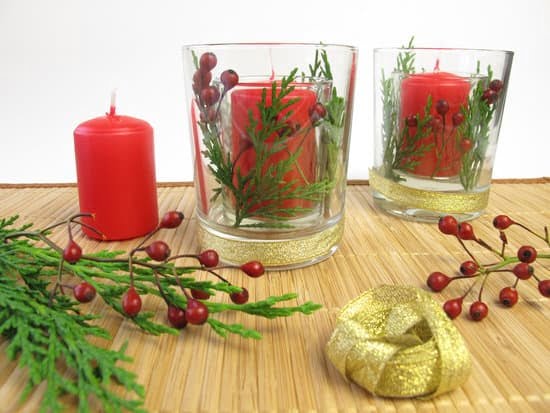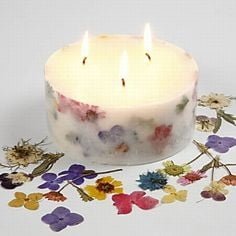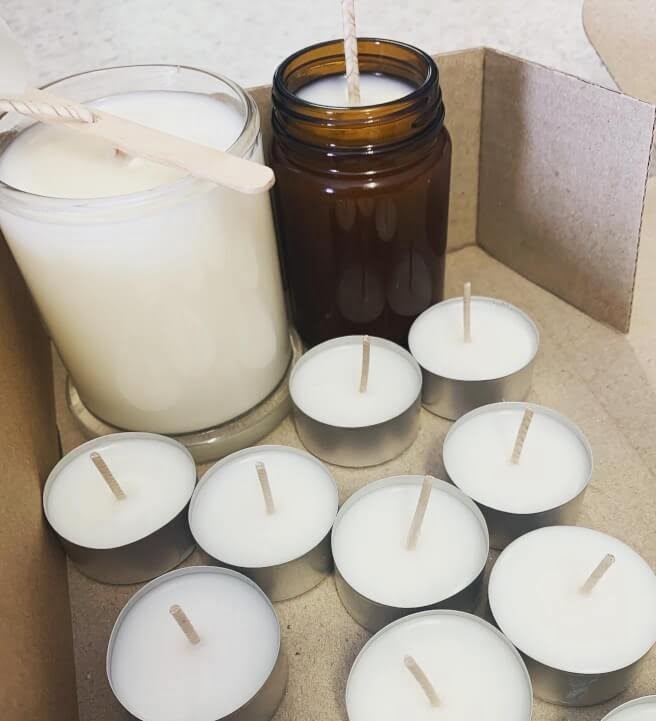Soap making and candle making may seem like two distinct crafts, but they actually share a common thread – fragrance oils. Fragrance oils add beautiful scents to both handmade soaps and candles, enhancing the sensory experience for users. However, this has sparked a query among crafters: can soap making fragrance oils be used for candles?
To understand the answer to this question, it is crucial to first comprehend what soap making fragrance oils are. These oils are specifically formulated to add scent to handmade soaps. They contain a blend of synthetic and natural fragrance components and typically have a lower scent load compared to candle fragrance oils.
However, when it comes to candles, there are notable differences between fragrance oils used in soap making and those designed for candles. Candle fragrance oils are created with higher scent loads and often include additional ingredients to improve their performance in wax. These differences in composition and characteristics raise the question of whether soap making fragrance oils can effectively be used for candle making.
In the following sections, we will delve into the intricacies of soap making fragrance oils versus candle fragrance oils. We will explore the factors that need to be considered when determining their compatibility as well as any potential risks or limitations associated with using soap making fragrance oils in candle making.
Ultimately, we aim to provide you with a comprehensive understanding of this issue so that you can make informed decisions about which type of fragrance oil best suits your crafting needs.
Understanding Soap Making Fragrance Oils
Soap making fragrance oils play a crucial role in adding delightful scents to handmade soaps. These fragrance oils are specifically formulated to withstand the harsh conditions of soap making, including high temperatures and strong alkaline environments. However, it is important to understand that soap making fragrance oils are not necessarily suitable for use in candles. In this section, we will explore the characteristics of soap making fragrance oils and their intended use in soap making.
Soap making fragrance oils are composed of a blend of synthetic aromatic compounds and natural essences. They are carefully formulated to ensure that the scent molecules remain stable throughout the saponification process. Additionally, these fragrance oils often contain fixatives to enhance the longevity of the scent in finished soaps. The composition of soap making fragrance oils typically differs from that of candle fragrance oils, which are designed to be used in candles.
The primary purpose of soap making fragrance oils is to provide a pleasant aroma to handmade soaps. These fragrance oils have different scent throw capabilities compared to candle fragrance oils, as they need to withstand the alkalinity and high temperatures involved in the soap-making process. Soap makers often prefer fragrance oils that do not accelerate trace or cause discoloration in their soaps.
| Characteristics | Soap Making Fragrance Oils | Candle Fragrance Oils |
|---|---|---|
| Saponification Stability | Designed to withstand high temperatures and alkaline environment of soap making. | Not designed for saponification process. |
| Scent Throw | May have lower scent throw due to their formulation for use in soaps. | Often formulated for a stronger scent throw in candles. |
| Trace and Discoloration | Preferably does not accelerate trace or cause discoloration in soaps. | May have different effects on candle wax, including potential discoloration. |
Soap making fragrance oils are specifically created to provide an enjoyable scent experience when used in soaps. While they may have enticing aromas, it is important to note that these fragrance oils may not possess the same performance characteristics required for candle making. In the next section, we will explore the key differences between soap making fragrance oils and candle fragrance oils to help you make informed decisions when selecting fragrances for your candles.
Composition Differences
Soap making fragrance oils and candle fragrance oils may seem similar, but there are significant differences in their composition and characteristics that make them suitable for their intended purpose. Understanding these composition differences is crucial to determine whether soap making fragrance oils can be used for candles.
One of the main differences lies in the flashpoint of the fragrance oil. The flashpoint refers to the temperature at which the fragrance oil can ignite when exposed to an open flame. Soap making fragrance oils typically have a lower flashpoint compared to candle fragrance oils, as they are not meant to come into direct contact with a heat source. Using soap making fragrance oils in candles can pose a safety hazard, as it increases the risk of fire hazards.
Another difference is in the scent throw, which refers to how well a fragrance disperses and fills a space with its aroma. Candle fragrance oils are specifically formulated to have a strong scent throw when melted and burned. On the other hand, soap making fragrance oils may not perform as effectively when it comes to scent throw in candles. They may not provide the desired level of aroma intensity or longevity when used in candle wax.
Additionally, soap making fragrance oils may contain ingredients that are not ideal for burning, such as additives or carriers that could affect the performance or aesthetics of candles. These ingredients may lead to issues such as soot buildup, uneven burning, or altered appearance of the wax pool.
To ensure compatibility and optimal performance, it is recommended to use fragrance oils that are specifically formulated for candle making. These oils have been carefully designed and tested to meet the specific requirements of candles regarding flashpoint, scent throw, burn performance, and overall safety.
Compatibility Factors
When considering whether soap making fragrance oils can be used for candle making, several compatibility factors need to be taken into account. These factors include the flashpoint of the oil, its scent throw in a burning candle, and its overall performance in terms of both scent and burn quality.
One important factor to consider is the flashpoint of the fragrance oil. The flashpoint is the temperature at which an oil can ignite when exposed to an open flame. Soap making fragrance oils typically have lower flashpoints compared to candle fragrance oils.
This means that using soap making fragrance oils in candles may result in a higher risk of flammability. It is crucial to ensure that the flashpoint of the fragrance oil being used is suitable for candle making to prevent any safety hazards.
Another factor to consider is the scent throw of the fragrance oil when used in a burning candle. Scent throw refers to how well the fragrance disperses and fills a space when a candle is lit. Soap making fragrance oils may not have been specifically formulated for use in candles, which can affect their scent throw.
Candle fragrance oils are designed with specific chemical compositions that allow them to disperse well when burned. Soap making fragrance oils might not provide the desired level of scent throw when used in candles.
Overall performance is also an important consideration when determining whether soap making fragrance oils can be used for candles. This includes evaluating both the scent quality and burn quality. Candle fragrance oils are blended with specific carrier oils that are designed to provide a clean burn and enhance the overall performance of the candle. Using soap making fragrance oils in candles might not achieve optimal results in terms of both scent quality and burn time.
Considering these compatibility factors is essential when deciding whether soap making fragrance oils can be used for candles. To ensure safety and achieve the desired scent and burn quality, it is recommended to use fragrance oils specifically formulated for candle making. These oils are specifically designed to meet the requirements of candle making, providing optimal results in terms of both performance and aesthetics.
| Compatibility Factors | Description |
|---|---|
| Flashpoint | The temperature at which an oil can ignite when exposed to an open flame. Soap making fragrance oils typically have lower flashpoints compared to candle fragrance oils. |
| Scent Throw | The ability of a fragrance oil to disperse and fill a space with scent when a candle is burned. Candle fragrance oils are designed with specific chemical compositions for optimal scent throw. |
| Overall Performance | Evaluation of both scent quality and burn quality. Using soap making fragrance oils in candles might not achieve optimal results compared to using specialized candle fragrance oils. |
Potential Risks and Limitations
Potential Safety Hazards
One of the potential risks of using soap making fragrance oils in candle making is the safety hazard it may pose. Soap making fragrance oils are formulated with specific ingredients that are deemed safe for use on the skin, but not necessarily safe for burning or heating. When these fragrance oils are exposed to heat from a burning candle, they may release toxic fumes or create a safety hazard.
It is important to note that certain ingredients commonly found in soap making fragrance oils, such as certain essential oils or botanical extracts, can have a low flashpoint. This means they can ignite at relatively low temperatures and may cause a fire hazard if used in candle making. In contrast, candle fragrance oils are specifically formulated to have higher flashpoints and be safer to use in candles.
Potential Impact on Candle Aesthetics
In addition to potential safety hazards, using soap making fragrance oils in candles may also affect the overall aesthetics of the finished product. Candle fragrance oils are specially designed to provide optimal scent throw and performance when used in candles. They are formulated to disperse evenly throughout the wax and produce a strong, pleasant aroma when the candle is burned.
Soap making fragrance oils, on the other hand, may not provide the same level of scent throw or may not perform as well in candle wax. The composition of these oils is typically different from that of candle fragrance oils, leading to potential issues such as weak scent throw, poor dispersion, or even discoloration of the wax. Therefore, using soap making fragrance oils in candles may result in subpar scent performance and an unsatisfactory end product.
It is important for candle makers to carefully consider these potential risks and limitations before deciding to use soap making fragrance oils in their candles. While it may be tempting due to cost or availability reasons, prioritizing safety and ensuring a high-quality final product should always be the top priority for candle makers.
Experimentation and Testing
One of the best ways to determine the suitability of soap making fragrance oils for candles is through experimentation and testing. While it is not recommended to use soap making fragrance oils directly in candle making, some individuals may still choose to explore this option. Conducting small-scale experiments and tests can help determine whether these oils can be used effectively in candle making.
Here are some guidelines and tips for conducting tests using soap making fragrance oils for candles:
- Start with a small batch: Begin by creating a small test batch of candles using the soap making fragrance oil you want to experiment with. This allows you to minimize potential waste while evaluating the performance of the oil.
- Dilution ratio: If you decide to proceed with using soap making fragrance oil, it is important to dilute it properly before incorporating it into your candle wax. Follow recommended dilution ratios provided by the fragrance oil manufacturer or consult other trusted resources.
- Burning characteristics: Pay attention to how the candle burns when using soap making fragrance oil. Note factors such as flame stability, smoke development, and overall burning performance. Be aware that using inappropriate fragrances can lead to issues like poor scent throw or even dangerous conditions like excessive smoking or soot formation.
- Scent throw assessment: Evaluate the scent throw or how well the fragrance disperses when the candle is burned. Check if it provides a satisfactory aroma intensity both while the candle is being burned and during cold throw (when unlit).
- Safety precautions: When conducting any experiments or testing with fragrance oils, always prioritize safety measures such as working in a well-ventilated area, wearing appropriate protective gear, and following proper handling instructions provided by suppliers.
It is essential to remember that while experimenting with soap making fragrance oils for candles may provide some insights, there are limitations and potential risks associated with this practice. For best results and optimal safety, it’s advisable to explore alternative options specifically formulated for candle making.
Alternatives for Candle Making
Specialized Candle Fragrance Oils
When it comes to candle making, using fragrance oils specifically formulated for candles is always the preferred option. These specialized oils are designed to provide optimal performance in candles, ensuring a strong and long-lasting scent throw. Unlike soap making fragrance oils, candle fragrance oils are specifically tailored to withstand the high heat generated by burning candles, allowing for a consistent and pleasant aroma throughout the candle’s lifespan.
Benefits of Using Specialized Candle Fragrance Oils
One of the main advantages of using fragrance oils made specifically for candles is their ability to enhance scent throw. Candle fragrance oils are created with formulations that maximize their scent dispersal when heated, resulting in a more powerful and noticeable aroma. This means that even with subtle scents, such as floral or herbaceous fragrances, you can still achieve a satisfying scent throw in your candles.
Additionally, specialized candle fragrance oils often come in a wider variety of scents compared to soap making fragrance oils. Manufacturers have developed extensive libraries of fragrances tailored specifically for candle making, giving crafters an array of options to choose from. Whether you prefer traditional scents like vanilla or lavender or more unique and complex blends, there is sure to be a candle fragrance oil available that will suit your preferences.
Choosing the Right Candle Fragrance Oils
When selecting candle fragrance oils, it’s important to look for those labeled specifically for use in candles. These oils should indicate that they have been tested and proven safe for candles at various concentrations. Opting for reputable suppliers that specialize in candle making supplies can also ensure you are selecting high-quality products.
Furthermore, consider factors such as flashpoint and compatibility with different waxes when choosing your candle fragrance oil. Flashpoint refers to the temperature at which the fragrance oil can ignite when exposed to an open flame or spark.
It is crucial to select a fragrance oil with a flashpoint that is higher than the melting point of your chosen wax to avoid any safety hazards. Additionally, certain fragrance oils may perform better with specific types of wax, so it’s worthwhile to research and experiment to find the most compatible combination.
By utilizing specialized candle fragrance oils, candle makers can ensure the highest quality results in terms of scent throw, performance, and safety. The abundance of fragrance options available for candles offers endless possibilities for creating unique and pleasing scents. However, if you choose to use soap making fragrance oils in candles, be sure to conduct thorough testing and follow proper dilution ratios to minimize any potential risks or limitations associated with their use.
Best Practices
For those who choose to use soap making fragrance oils for candle making, it is important to follow a set of best practices to ensure optimal results. By following these guidelines, you can mitigate potential risks and achieve the desired scent throw and performance in your candles.
Firstly, it is crucial to read and understand the manufacturer’s instructions and recommendations for the specific soap making fragrance oil you plan to use. Each fragrance oil may have different guidelines regarding its usage in candle making. Pay attention to any recommended dilution ratios, as using too much fragrance oil can negatively impact both the burn quality of your candles and their scent throw.
When it comes to diluting soap making fragrance oils for candles, it is generally recommended to start with a lower concentration and gradually increase as needed. This allows you to find the ideal balance between achieving a strong scent throw without causing undesirable effects such as excessive smoking or poor burn characteristics. Keep in mind that some fragrance oils may require more or less dilution than others, depending on their potency.
In terms of safety precautions, always work in a well-ventilated area when handling fragrance oils. Some fragrance oils may contain potentially harmful chemicals or allergens that could cause respiratory issues or skin sensitivities. It is advisable to wear protective gloves and goggles while handling concentrated fragrance oils, especially during the blending process.
Lastly, remember that experimenting and testing are key when using soap making fragrance oils for candles. Conduct small-scale tests before committing to larger batches to observe how the fragrance oil performs in terms of scent throw, burn quality, and overall aesthetics. It is essential to evaluate whether the chosen soap making fragrance oil meets your expectations before investing significant time and resources into candle production.
By following these best practices, individuals who choose to use soap making fragrance oils for candles can achieve satisfactory results while minimizing potential risks associated with improper usage. However, it is essential to note that using fragrance oils specifically formulated for candle making is generally recommended, as they are designed to address the specific requirements and characteristics needed for optimal candle performance.
Conclusion
The importance of using suitable fragrance oils for their intended purpose cannot be emphasized enough. Throughout this article, we have explored the common link between soap making and candle making and addressed the query of whether soap making fragrance oils can be used for candles. We have discussed the composition differences between soap making fragrance oils and candle fragrance oils, as well as the factors to consider when determining their compatibility for candle making.
While soap making fragrance oils may seem similar to candle fragrance oils on the surface, it is crucial to understand their varying compositions and characteristics. Soap making fragrance oils are specifically formulated for use in soap making and may not perform optimally in candles. They often have a lower flashpoint and may not provide sufficient scent throw when used in candles.
Using soap making fragrance oils in candle making comes with potential risks and limitations that should be taken into consideration. These include safety hazards such as increased flammability, as well as potential impacts on the aesthetics of the candle, such as discoloration or uneven burning. It is important to conduct small-scale experiments and tests to determine the suitability of soap making fragrance oils for candles.
While some individuals may still choose to use soap making fragrance oils for candles, it is recommended to explore alternative options that are specifically formulated for candle making. These specialized oils are designed to provide optimum performance in terms of scent throw, burn quality, and safety. They are readily available from various reputable suppliers who cater specifically to candle makers.
Resources and Recommendations
In conclusion, when it comes to crafting candles, it is essential to use fragrance oils specifically formulated for candle making. While soap making fragrance oils may share similar scents with their candle making counterparts, they are not necessarily interchangeable. The composition differences between soap making and candle fragrance oils can have various implications on the safety and performance of the candles.
To ensure the best results in your candle making endeavors, it is recommended to explore reputable resources and suppliers that offer fragrance oils specifically created for candles. These specialized fragrance options have been carefully formulated to meet the unique requirements of the candle making process, including considerations such as flashpoint, scent throw, and overall performance.
By using fragrance oils designed for candle making, you can minimize potential risks and limitations associated with using soap making fragrance oils in candles. These specialized oils will help you achieve optimal safety levels and enhance the overall aesthetic appeal of your candles.
For those interested in obtaining high-quality fragrance oils tailored for candle making, there are numerous reliable suppliers available. It is advisable to explore well-known industry brands or consult online communities dedicated to candle making that provide recommendations based on personal experiences.
Ultimately, while experimenting with different fragrances can be an exciting part of the creative process, it is crucial to prioritize safety and adhere to best practices by utilizing suitable fragrance oils specifically formulated for their intended purpose. By doing so, you can create beautiful and fragrant candles that bring joy to both yourself and those who experience them.
Frequently Asked Questions
Can any fragrance oil be used in candles?
No, not all fragrance oils can be used in candles. While some fragrance oils are appropriate for candle making, others may not be suitable due to their flashpoint, which is the temperature at which a substance can ignite. Candle making requires fragrance oils with a higher flashpoint to ensure safety during the burning process.
Additionally, certain fragrance oils may contain ingredients that could negatively impact the quality or performance of the candle wax. It is always advisable to use fragrance oils specifically formulated for candle making to achieve the best results.
Does Bath and Body Works use essential oils in candles?
Yes, Bath and Body Works does use essential oils in candles, but they also utilize synthetic fragrances as well. Their product range includes scented candles that incorporate a blend of natural essential oils and manufactured scent compounds designed to produce specific aromas.
Essential oils are derived from botanical sources such as flowers and plants through methods like steam distillation, whereas synthetic fragrances are artificially created using various chemical processes. The combination of essential oils and synthetic fragrances allows Bath and Body Works to create a wide variety of appealing scents for their candles.
What is the difference between fragrance oil and essential oil for soap making?
The main difference between fragrance oil and essential oil for soap making lies in their origin and composition. Fragrance oils are typically synthetic compounds created in laboratories that replicate particular scents found in nature or offer unique fragrances not found naturally occurring. On the other hand, essential oils are natural extracts obtained from plants or botanical sources using techniques like steam distillation or cold pressing.
Essential oils retain the characteristic aromas of the plant they were derived from and also often contain beneficial properties associated with those plants. When it comes to soap-making, both fragrance oils and essential oils can be used to add scent; however, because essential oils are purely natural extracts, they tend to be favored by those seeking more organic or holistic soap products while fragrance oils provide broader scent options for creative experimentation in soap-making projects.

Welcome to my candle making blog! In this blog, I will be sharing my tips and tricks for making candles. I will also be sharing some of my favorite recipes.





